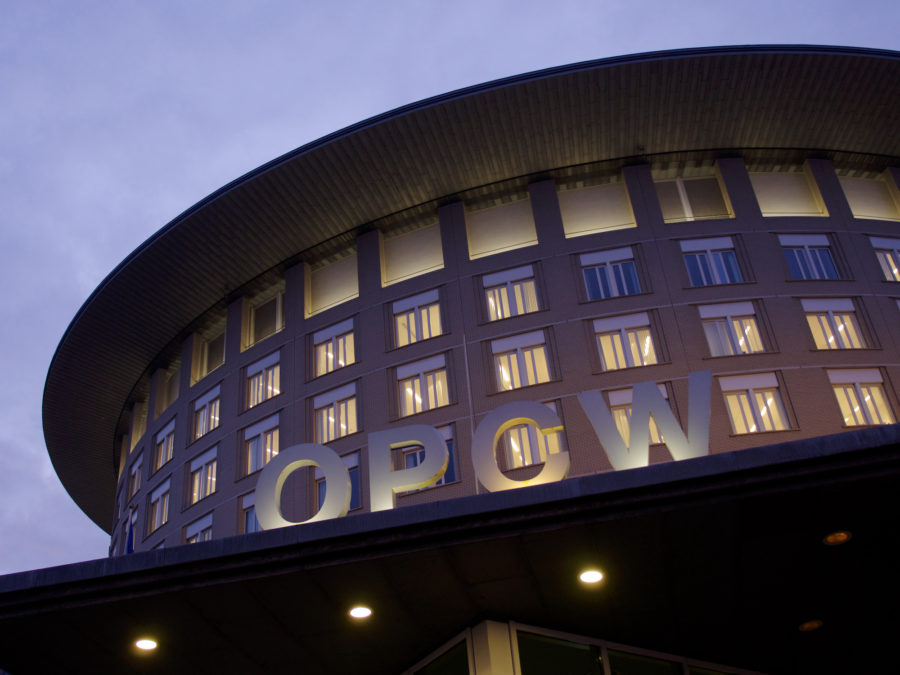3rd May 2022
What does the Chemical Weapons Convention mean to me?

Alastair Hay has a BSc in Chemistry and PhD in Biochemistry from London University. After a research career as a teacher, toxicologist, and former adviser to the UK government and European Union on occupational standards for chemicals in the workplace, Alastair retired from the University of Leeds in 2015, but retains a position at the university as Professor (Emeritus) of Environmental Toxicology. Alastair chairs the UK Chemical Weapons Convention Advisory Committee and was a member of the OPCW Technical Working Group on Education and Outreach and a member of the OPCW’s Advisory Board on Education and Outreach from 2016 – 21.
Who would not want a treaty that outlaws use of chemicals in warfare? A treaty which would avoid being described as: ‘Bent double, like old beggars under sacks, knock-kneed, coughing like hags …. he plunges at me, guttering, choking, drowning …’? The imagery, in this extract from British First World War poet Wilfred Owen’s ‘Dulce Et Decorum Est’ could hardly be more stark, and is that of a keen observer of the use of chemical weapons.
My first encounter with victims of chemical weapons in 1986 was far more sanitised. I was interviewing, and examining (orally), Iranian victims of injuries caused by the blistering agent mustard gas. The patients, injured by Iraqi chemical weapons, were being treated in a London hospital. Between 1986 and April 1988, I interviewed some 30 chemical weapon’s patients in various London hospitals, including 5 Kurds, injured when Iraq attacked the Kurdish city of Halabja with nerve agents and mustard gas on 17 March 1988.
In that attack on Halabja an estimated 5000 Kurds died in the most horrific ways imaginable, and largely from exposure to nerve agents. The injured numbered some 12,000 and most of these were the victims of mustard gas. Most were civilians, including many children. Colleagues and I recently carried out an investigation of some 400 adults, who were children at the time of their exposure, and many still have health problems attributable to the mustard agent.
It was in the early 1970s that I became concerned about the misuse of chemicals both on people and the environment, and in the early 1980s that I teamed up with other academics to campaign, specifically, against the use of chemical weapons. Our initial concern was that chemical weapons might be used in a conflict between NATO and the then Warsaw Pact countries of the Soviet Union and eastern Europe. We knew that the Soviet Union had sizeable stocks (never acknowledged at the time), which were later inherited by Russia and numbered some 40,000 tonnes of chemical agent. The United States admitted to possessing some 30,000 tonnes, some of which was sited in West Germany. A sizeable portion of both stockpiles were nerve agents and we envisaged their use causing huge numbers of casualties for both combatants and civilians.
Iraq’s use of chemical weapons against Iran and the Kurds confirmed that these were weapons which had a disproportionate effect on civilians, and that these were likely to be the victims whenever the weapons were used in future. The world watched the onslaught against the Kurds and sadly did little to stop it. But it did note the civilian victims of chemical weapons and that spurred on negotiations to agree what became the Chemical Weapons Convention (CWC).
I am not alone in admiring the CWC and what it has achieved by way of membership with only 4 countries not fully signed up; how it has facilitated the destruction under the supervision of the Organisation for the Prohibition of Chemical Weapons (OPCW) of some 99% of the chemical weapons states have declared; and how the OPCW works with partners, like the chemical industry, to inspect chemical facilities to audit production and reassure member states that countries are being truthful in declarations about their industry.
The CWC has made the world a safer place at least as far as use of chemical weapons are concerned. Who knows what additional horrors might have confronted us had it not been in place and requiring a modern Wilfred Owen to pen an ode to new suffering. Thank you CWC! And congratulations on this, your 25th birthday!
Note: British Embassy The Hague offers its blog platform for guest posts. The views expressed in the guest posts are those of the authors.
